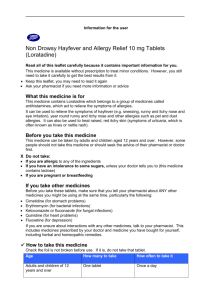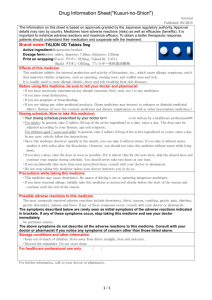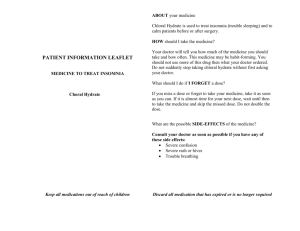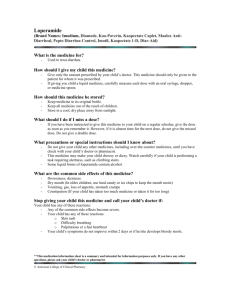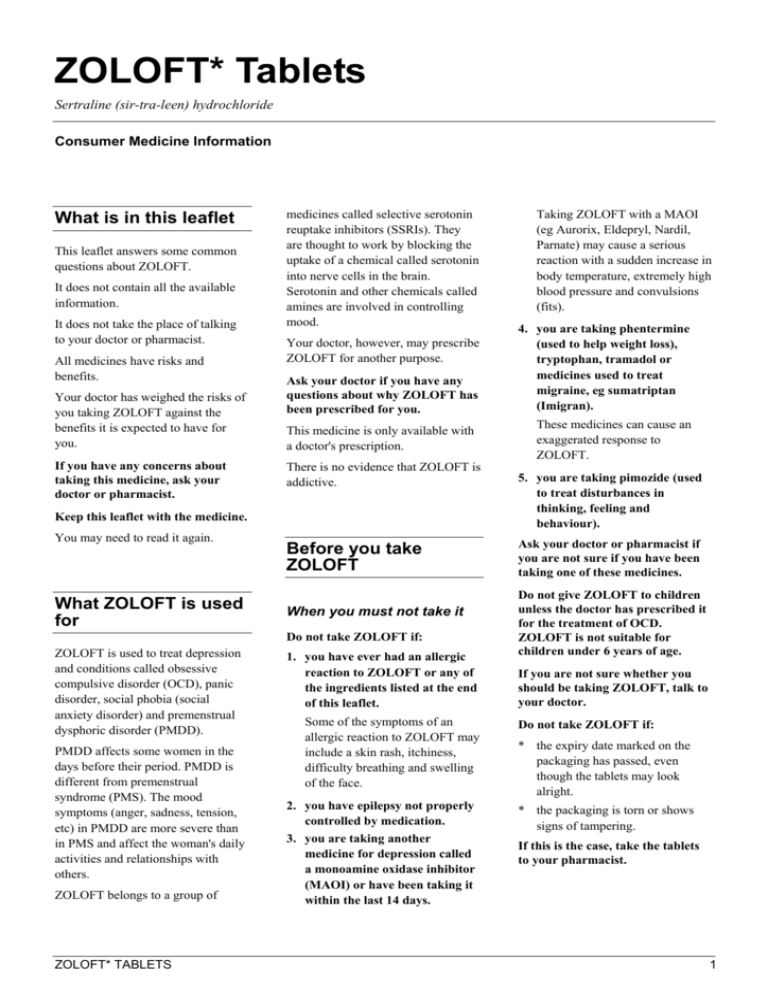
ZOLOFT* Tablets
Sertraline (sir-tra-leen) hydrochloride
Consumer Medicine Information
What is in this leaflet
This leaflet answers some common
questions about ZOLOFT.
It does not contain all the available
information.
It does not take the place of talking
to your doctor or pharmacist.
All medicines have risks and
benefits.
Your doctor has weighed the risks of
you taking ZOLOFT against the
benefits it is expected to have for
you.
If you have any concerns about
taking this medicine, ask your
doctor or pharmacist.
medicines called selective serotonin
reuptake inhibitors (SSRIs). They
are thought to work by blocking the
uptake of a chemical called serotonin
into nerve cells in the brain.
Serotonin and other chemicals called
amines are involved in controlling
mood.
Your doctor, however, may prescribe
ZOLOFT for another purpose.
Ask your doctor if you have any
questions about why ZOLOFT has
been prescribed for you.
This medicine is only available with
a doctor's prescription.
There is no evidence that ZOLOFT is
addictive.
Keep this leaflet with the medicine.
You may need to read it again.
What ZOLOFT is used
for
Before you take
ZOLOFT
When you must not take it
Do not take ZOLOFT if:
ZOLOFT is used to treat depression
and conditions called obsessive
compulsive disorder (OCD), panic
disorder, social phobia (social
anxiety disorder) and premenstrual
dysphoric disorder (PMDD).
PMDD affects some women in the
days before their period. PMDD is
different from premenstrual
syndrome (PMS). The mood
symptoms (anger, sadness, tension,
etc) in PMDD are more severe than
in PMS and affect the woman's daily
activities and relationships with
others.
ZOLOFT belongs to a group of
ZOLOFT* TABLETS
1. you have ever had an allergic
reaction to ZOLOFT or any of
the ingredients listed at the end
of this leaflet.
Some of the symptoms of an
allergic reaction to ZOLOFT may
include a skin rash, itchiness,
difficulty breathing and swelling
of the face.
2. you have epilepsy not properly
controlled by medication.
3. you are taking another
medicine for depression called
a monoamine oxidase inhibitor
(MAOI) or have been taking it
within the last 14 days.
Taking ZOLOFT with a MAOI
(eg Aurorix, Eldepryl, Nardil,
Parnate) may cause a serious
reaction with a sudden increase in
body temperature, extremely high
blood pressure and convulsions
(fits).
4. you are taking phentermine
(used to help weight loss),
tryptophan, tramadol or
medicines used to treat
migraine, eg sumatriptan
(Imigran).
These medicines can cause an
exaggerated response to
ZOLOFT.
5. you are taking pimozide (used
to treat disturbances in
thinking, feeling and
behaviour).
Ask your doctor or pharmacist if
you are not sure if you have been
taking one of these medicines.
Do not give ZOLOFT to children
unless the doctor has prescribed it
for the treatment of OCD.
ZOLOFT is not suitable for
children under 6 years of age.
If you are not sure whether you
should be taking ZOLOFT, talk to
your doctor.
Do not take ZOLOFT if:
* the expiry date marked on the
packaging has passed, even
though the tablets may look
alright.
* the packaging is torn or shows
signs of tampering.
If this is the case, take the tablets
to your pharmacist.
1
Before you start to take it
Tell your doctor if:
phentermine (weight-reducing
medicines) and medicines used to
treat migraine, eg sumatriptan.
You are allergic to any foods, dyes,
preservatives or any other
medicines
* pimozide (used to treat
disturbances in thinking, feeling
and behaviour)
You have any health problems,
including:
You may respond differently to
ZOLOFT, or to some other
medicines, if you take them together.
These include (not all brands given):
* any other mental illness
* epilepsy or seizures
* liver or kidney problems
* a tendency to bleed more than
normal
You are pregnant or intend to
become pregnant
The effects of ZOLOFT on the
developing baby are not yet known.
There have been reports that babies
exposed to ZOLOFT and other
antidepressants during the second or
third trimester of pregnancy may
develop complications after birth.
You are breastfeeding or wish to
breastfeed
ZOLOFT passes into breast milk and
may affect your baby.
Your doctor will discuss the risks
and benefits of using ZOLOFT when
pregnant or breastfeeding.
Taking other medicines
Tell your doctor if you are taking
any other medicines, including
medicines you buy without a
prescription from a pharmacy,
supermarket or health food shop.
Some medicines should not be
taken with ZOLOFT.
These include:
* other medicines for the treatment
of depression called monoamine
oxidase inhibitors (MAOIs).
Taking ZOLOFT with, or within
14 days of stopping a MAOI may
cause a serious reaction with a
sudden increase in body
temperature, extremely high
blood pressure and convulsions.
* medicines that can increase the
effects of ZOLOFT such as
tramadol, tryptophan, or
ZOLOFT* TABLETS
* other medicines for depression,
panic disorder, social anxiety
disorder or obsessive illnesses
(eg Prothiaden, Pertofran, Prozac,
Aropax, Luvox, Cipramil,
Efexor)
* other medicine for PMDD (eg
Prozac and Lovan)
* St John's wort, a herbal remedy
used to treat mood disorders
* clozapine, (eg Clozaril) a
medicine used to treat
schizophrenia
* medicines for irregular heart beat
(eg Tambocor)
* warfarin (eg Marevan,
Coumadin) or other medicines
that stop the blood from clotting
* medicines used to relieve pain,
swelling and other symptoms of
inflammation, including arthritis
(eg aspirin or NSAIDs such as
ibuprofen or diclofenac)
* lithium (eg Lithicarb), a medicine
used to treat mood swings
* phenytoin (eg Dilantin), a
medicine used to treat epilepsy
* sumatriptan (eg Imigran), a
medicine used to treat migraine
* diazepam or other medicines that
act on the brain or nervous
system (eg Serepax, Valium)
* cimetidine (eg Tagamet), a
medicine used to treat reflux and
ulcers
* tolbutamide (eg Rastinon), a
medicine used to treat diabetes
* methadone, a medicine used to
treat drug addiction
Your doctor or pharmacist has more
information on medicines to be
careful with or avoid while taking
ZOLOFT.
If you have not told your doctor or
pharmacist about these things, tell
them before you start taking
ZOLOFT.
How to take ZOLOFT
Take ZOLOFT exactly as your
doctor has prescribed.
Follow all directions given to you
by your doctor. They may differ
from the information contained in
this leaflet.
How much to take
For DEPRESSION IN ADULTS
the usual starting dose for
ZOLOFT is one 50 mg tablet each
day. The dose can be increased
gradually up to 200 mg a day if
necessary.
For OBSESSIVE COMPULSIVE
DISORDER IN CHILDREN (6-12
YEARS) the usual starting dose for
ZOLOFT is 25 mg/day (half a 50
mg tablet), increasing to 50 mg/day
after one week.
For OBSESSIVE COMPULSIVE
DISORDER IN ADULTS AND
ADOLESCENTS (13-18 YEARS)
the usual starting dose for
ZOLOFT is one 50 mg tablet each
day.
For PANIC DISORDER IN
ADULTS the usual starting dose
for ZOLOFT is 25 mg per day,
increasing to 50 mg per day after
one week.
For SOCIAL PHOBIA (SOCIAL
ANXIETY DISORDER) IN
ADULTS the usual starting dose
for ZOLOFT is 25 mg per day,
increasing to 50 mg per day after
one week.
The maximum recommended dose of
ZOLOFT for the conditions listed
above is 200 mg per day.
For PREMENSTRUAL
DYSPHORIC DISORDER the
usual starting dose for ZOLOFT is
one 50 mg tablet each day, either
throughout the menstrual cycle (to
a maximum of 150 mg daily) or for
2
the last 14 days before the start of
menses (to a maximum of 100 mg
daily).
However, depending on your
condition and how you react to the
medicine, your doctor may ask you
to take some other dose.
How to take it
Swallow the tablet(s) with a glass
of water.
Try to take your tablet(s) at the
same time each day, either
morning or evening.
(Casualty) at your nearest hospital
if you think you or anyone else
may have taken too much
ZOLOFT, even if there are no
signs of discomfort or poisoning.
You may need urgent medical
attention.
Signs and symptoms of suicide
include:
Keep telephone numbers for these
places handy.
* Any recent attempts of self-harm
If you take too many tablets, you
may feel drowsy, sick in the stomach,
have a fast heart beat, suffer from
tremors, feel agitated or dizzy. Coma
has also been reported with overdose.
ZOLOFT can be taken with or
without food.
How long to take it
Most medicines for depression and
obsessive illnesses take time to work,
so do not be discouraged if you do
not feel better straight away.
It may take 2 to 4 weeks or even
longer to feel the full benefit of
ZOLOFT.
Even when you feel well, you may
need to take ZOLOFT for several
months or longer. Continue taking
ZOLOFT until your doctor tells you
to stop.
If you have PMDD, your doctor may
ask you to take this medicine only at
certain times of the month.
Do not stop taking ZOLOFT, or
change the dose, without first
checking with your doctor.
If you forget to take it
Do not take an extra dose. Wait
until the next day and take your
normal dose then.
Do not try to make up for the dose
you missed by taking more than
one dose at a time.
If you take too much
(overdose)
Immediately telephone your doctor
or Poisons Information Centre
(telephone 13 11 26) for advice, or
go to Accident and Emergency
ZOLOFT* TABLETS
While you are taking
ZOLOFT
* Thoughts or talk of death or
suicide
* Thoughts or talk of self-harm or
harm to others
* Increase in aggressive behaviour,
irritability or agitation
* Worsening of depression
Mention of suicide or violence
must be taken seriously.
If you or someone you know is
demonstrating these warning signs
of suicide while taking ZOLOFT,
contact your doctor or a mental
health professional right away.
Things you must not do
Things you must do
Tell all doctors, dentists and
pharmacists who are treating you
that you are taking ZOLOFT.
Tell your doctor or pharmacist
that you are taking ZOLOFT if
you are about to be started on any
new medicines.
Tell your doctor if you become
pregnant while taking ZOLOFT.
If you are a woman of child-bearing
age, you should avoid becoming
pregnant while taking ZOLOFT.
Tell your doctor immediately if
you have any suicidal thoughts or
other mental/mood changes.
Do not stop taking ZOLOFT, or
change the dose, without first
checking with your doctor.
Do not let yourself run out of
tablets over the weekend or on
holidays.
Suddenly stopping ZOLOFT may
cause dizziness, lightheadedness,
numbness, unusual tingling feelings
or shakiness.
Do not give this medicine to
anyone else, even if their symptoms
seem similar to yours.
Do not use ZOLOFT to treat any
other complaints unless your
doctor says to.
A worsening of depressive
symptoms including thoughts of
suicide or self-harm may occur in
the first one or two months of you
taking Zoloft or when the doctor
changes your dose. These
symptoms should be controlled
when the full effect of Zoloft takes
place.
Things to be careful of
Children, adolescents or young
adults under 24 years of age are
more likely to experience these
effects during the first few months
of treatment.
Although drinking moderate
amounts of alcohol is unlikely to
affect your response to ZOLOFT,
your doctor may suggest avoiding
alcohol while you are taking
ZOLOFT.
Patients and caregivers should be
alert and monitor for these effects.
Be careful driving or operating
machinery until you know how
ZOLOFT affects you.
Some medicines for depression may
affect your ability to drive or operate
machinery or do things that could be
dangerous if you are not alert.
You should wait at least 14 days
3
after stopping ZOLOFT before
starting medicines for depression
or obsessive illnesses from the
MAOI group, such as Aurorix,
Eldepryl, Nardil, Parnate.
energy, headache, irritability,
nausea, trouble sleeping and
tingling or numbness of the
hands and feet after stopping
ZOLOFT.
All of the above precautions are
important even after you have
stopped taking ZOLOFT.
These symptoms are usually rare but
may be serious and need urgent
medical attention.
The effects of ZOLOFT may last for
some days after you have stopped
taking it.
Tell your doctor if you experience:
Side effects
Check with your doctor as soon as
possible if you have any problems
while taking ZOLOFT, even if you
do not think the problems are
connected with the medicine or are
not listed in this leaflet.
Like other medicines, ZOLOFT can
cause some side effects. If they
occur, most are likely to be minor
and temporary. However, some may
be serious and need medical
attention.
Tell your doctor immediately, or
go to your nearest hospital if you
notice any of the following:
* fits or seizures
* signs of allergy such as rash or
hives, swelling of the face, lips or
tongue, wheezing or difficulty
breathing
* symptoms of sudden fever with
sweating, fast heart beat and
muscle stiffness, which may lead
to loss of consciousness
* palpitations or chest pain
* abnormal bleeding
* difficulty in passing urine or
blood in the urine
* severe blisters and bleeding in the
lips, eyes, mouth, nose and
genitals
* fever, sore throat, swollen glands,
mouth ulcers, unusual bleeding
or bruising under the skin
* symptoms of agitation, anxiety,
confusion, dizziness, feeling
tense and restless, feeling of
tiredness, drowsiness, or lack of
ZOLOFT* TABLETS
* headache, dizziness, shakiness,
muscle stiffness or weakness,
decrease or loss of touch or other
senses
* dry mouth, increased sweating,
feeling sick, diarrhoea,
indigestion, vomiting,
constipation, stomach pain
* tiredness, hot flushes, fever,
feeling unwell
* weight increase or loss
* sleeping difficulties, sleepiness
* sexual problems
* agitation, nervousness, anxiety,
frightening dreams, yawning,
abnormal thinking, teeth
grinding, loss of appetite,
impaired concentration
* vision disturbance
* menstrual irregularities
* loss of control of your bladder
*
*
*
*
*
unusually overactive
shaking or tremors
unusual hair loss or thinning
swelling of hands, ankles or feet
tingling or numbness of the
hands or feet
* breast enlargement in men or the
unusual secretion of breast milk
in men or women
* increased sensitivity of the skin
to sun
* ringing or other persistent noise
in the ears
These side effects are usually mild.
This is not a complete list of all
possible side effects. Others may
occur in some people and there may
be some side effects not yet known.
Tell your doctor if you notice
anything else that is making you
feel unwell, even if it is not on this
list.
Ask your doctor or pharmacist if
you do not understand anything in
this list.
After taking ZOLOFT
Storage
Keep your tablets where young
children cannot reach them.
A locked cupboard at least one and a
half metres above the ground is a
good place to store medicines.
Keep ZOLOFT in a cool, dry place
where the temperature stays below
30 degrees Celsius. Do not store it
or any other medicine in the
bathroom or near a sink.
Do not leave it in the car or on
window sills.
Heat and dampness can destroy some
medicines.
Keep your tablets in their blister
pack until it is time to take them.
Disposal
If your doctor tells you to stop
taking ZOLOFT, or the tablets
have passed their expiry date, ask
your pharmacist what to do with
any left over.
Product description
What it looks like
ZOLOFT tablets come in two
strengths:
* ZOLOFT 50 mg - white,
capsule-shaped scored tablets
marked with ZLT 50 on one side
and the Pfizer logo on the other.
* ZOLOFT 100 mg - white,
capsule-shaped tablets marked
with ZLT-100 on one side and
the Pfizer logo on the other.
A box contains 30 tablets.
4
Ingredients
Active ingredients
* ZOLOFT 50 mg 50 mg sertraline per tablet
* ZOLOFT 100 mg 100 mg sertraline per tablet
Other ingredients
Cellulose (microcrystalline), calcium
hydrogen phosphate, hydroxypropyl
cellulose, sodium starch glycollate,
magnesium stearate, white Opadry,
clear Opadry.
ZOLOFT does not contain gluten,
lactose or sugar.
Manufacturer
ZOLOFT is supplied in Australia
by:
Pfizer Australia Pty Ltd
ABN 5000 8422 348
38-42 Wharf Road
West Ryde NSW 2114
Australia
Toll Free Number: 1800 675 229
Australian Registration
Number:
ZOLOFT 50 mg - AUST R 42979
ZOLOFT 100 mg - AUST R 42950
This leaflet was prepared on 13
October 2008
* Registered Trademark
(C) Pfizer Australia Pty Ltd
All rights reserved
ZOLOFT* TABLETS
5



